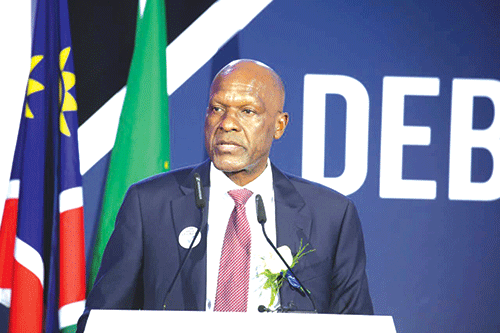Consumers, who are already struggling with massive increases in food prices and more expensive bank loans, will have to tighten their belts further, as government yesterday announced massive fuel price increases.
The mines ministry confirmed petrol prices will increase by N$2.50 per litre, while diesel will increase by N$1.50 per litre from Wednesday, 1 June.
This will bring Walvis Bay petrol prices to N$20.40 per litre and diesel to N$21.43 per litre. Making the announcement, mines deputy minister Kornelia Shilunga said the ministry is fully aware that the public is under a lot of financial pressure as far as the price of fuel is concerned.
“The public is reminded that Namibia is a price-taker in the international oil market. It is, therefore, important to understand the government is only in direct control at the level of the domestic levies, taxes and margins regarding the price of fuel,” she said.
Last month, Cabinet approved the mines and energy ministry’s recommendation to temporarily reduce fuel levies for three months (May to July 2022) by 50%.
Fuel levies and taxes make up 34% to 45% of the cost of Namibian fuel per litre.
Specific levies imposed on Namibian petrol and diesel prices include a customs and excise duty for the SACU Revenue Pool; National Energy Fund Fuel Levy (comprised of the fuel equalisation levy, Namcor levy and National Oil Storage Facility levy); road user charges, which go to Road Fund Administation (RFA) for road maintenance; fuel tax, which is collected by the Ministry of Finance for the State Revenue Fund, and the Motor Vehicle Accident (MVA) Fund levy, which is used to finance the activities of MVA, such as providing financial assistance to road accident victims. Levies that were reduced include the road user charges (from 148 to 74 cents per litre), the fuel levy (from 90 to 45 cents per litre), the NAMCOR levy (from 7.6 to 3.8 cents per litre) and the MVA levy by 25% (from 50.3 to 37.725 cents per litre).
During yesterday’s media briefing, however, Shilunga observed the main factors for this increase are the geopolitical tensions in Eastern Europe and its repercussions, as well as a widening mismatch between global oil supply and oil demand.
Shilunga further explained that the global refining capacity has fallen significantly since 2020 due to the Covid-19 pandemic.
She said: “Oil markets are seeing an upward pricing trend due to the pending import ban by the European Union (EU) on Russian crude. This is expected to further tighten global supply. The EU has proposed a new package of sanctions against Russia due to the events in Ukraine, including a total ban on oil imports in six months”.
According to her, although the measures have not yet been adopted, they only serve to further stoke fear of an oil supply crisis globally. Shilunga further explained the ministry’s fuel price review for 1-20 May 2022 indicated that the average prices for ULP 95 (petrol) increased from end of April at US$126.260 to US$142.781 per barrel, while the average price for diesel 50ppm increased from US$150.117 to US$152.147 per barrel. Furthermore, the exchange rate for the period under review recorded a huge drop against the US dollar at N$15.9606 per US$.
This huge currency depreciation entails that the business of conducting international transactions becomes more expensive. Said Shilunga: “Our recent review, therefore, shows huge under-recoveries recorded during the trading cycle under review – that is 250 cents per litre on petrol and 150 cents per litre on diesel”.
Economic Impact
Economist in the energy ministry Abednego Ekandjo said at the macroeconomic level that the increase is expected to affect all consumers in the country, as fuel remains an input for all sectors.
“This is a major increase – and we hope going forward, the international oil market will respond positively to help curb the increasing prices for our consumers,” noted Ekandjo.
Sharing a word of advice, economist Salomo Hei said is time for consumers to be innovative and accommodative.
“This is unpleasant news for consumers, and it is a very difficult period for them. Consumers should now be innovative on how to survive with such hikes. Consider using public transport and also sharing vehicles just for the pocket to be left with something,” he explained.
Windhoek motorist Pahee Tjiurutue asked: “Is it time to park our cars?”
With shock, Tjiurutue noted one would understand where the increases emanate from but questioned whether there are no other ways government could curb such prices. According to him, consumers are already struggling from the pandemic effects – and as motorists, they cannot fuel cars anymore.
He also advised new motorists to choose wisely when buying cars in terms of fuel consumption.
Mally Likukela, MD of Twilight Capital, warned this increase will have a devastating effect on the economy in general and households in particular.
“The main effect on the general economy is that it will slow down and even reverse the recovery process that was already showing good signs. At an individual level, households will have to contend with a more reduced purchasing power of their meagre income. Individuals will sink deeper into debt, and most people will fall back into poverty. The cost of living will further aggravate the social unrests and anxiety that has been evident across the country in recent times,” said Likukela.
Meanwhile, small and upcoming businesses will have to make do with even lower profit margins already stifled by inflation and Covid-19 setbacks.
And, as consumers continue to suffer the most demoralising blows from a global economy in freefall, they are forced to borrow more to make ends meet.
One micro lender commented that clients must borrow less to meet their monthly budgets.
“Clients who have debit orders via cash loans will have less money to put food on the table. This is because micro lenders’ expenses become more and will be able to borrow less,” said Nicolaas Haid, owner of Guanito’s Financial Solutions.
– mndjavera@nepc.com.na



